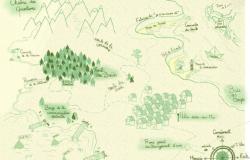The master of Belgian literature left us this Sunday; Pierre Mertens was 85 years old. He had just published his latest novel, Paysage sans Véronique published by Impressions Nouvelles which had been in the making since the death of Véronique Pierroton in a hotel room in Ostend. He did not believe his friend’s suicide theory. I’m relieved that he was able to hold his novel in his hands before closing his eyes for good. Born on October 9, 1939 in Berchem-Sainte-Agathe, the writer was a doctor of law, specialist in international law and director of the Center for the Sociology of Literature at the Free University of Brussels. A committed jurist, he spoke regularly on the public stage and did not hesitate to mix fiction and historical testimonies in his work, as in his splendid short story L’ami de mon amis. Born to a resistant father and a Jewish mother, he was a “hidden child” during the Second World War and would never speak of it until he was seventy. Jean-Pierre Orban evokes this page of his history in The Century for Memory, a masterful and fascinating biography, published in 2018, which traces his life and his work. Prix Médicis for Les éblouissements in 1987, Prix Rossel for his first novel L’Inde ou l’Amérique, he was a member of the Royal Academy of French Language and Literature of Belgium and named Knight of the Order of Arts and Letters of the French Republic knight. Here’s to the honors. Above all, he was a funny man, with prodigious verbal intelligence, open to others and a remarkable listener to writers. I was lucky enough to receive him several times in my shows. He spoke with happiness of his favorite writers, Kafka, the first, the harbinger for him of literature in his life, Pasolini whose tow voice he imitated, Milan Kundera who was close to him. He also detailed the alliances between medicine and literature and then became the champion of Chekhov and his unfailing humanity. He wrote a splendid text on Alban Berg, who died of a wasp sting at the age of 50. Because music was his second passion and his meeting with Arvo Pärt was a marvel to him. With A Royal Peace, he moved, as he himself said, from literary chronicle to judicial chronicle. Major work where he plunged back into the bath of childhood and cycling, the little queen who made him cross paths with King Baudoin whose car hit the boy’s bicycle. A sign of the Gods and goddesses, in royal peace he gave a moving portrait of King Leopold and a Belgium threatened by the waters of a great maritime upheaval. Leopold’s widow did not appreciate certain passages. You must read or reread this flamboyant and baroque work where the writing of Pierre Mertens is at its peak. Pierre Mertens gives up his pen and no one can take it. We are left with his novels as a legacy and his cheerful voice in our past exchanges.






